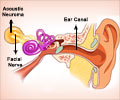Cochlear implant can work better with more electrodes and more flexible wire, say a team of Medical College of Georgia and Georgia Institute of Technology researchers.
Candidates for cochlear implants — an estimated million in the United States alone — include children and adults with profound deafness in both ears. An implant does not restore normal hearing but simulates sounds in the environment, including speech. More electrodes pick up more external sound and the flexible wire allows those sounds to be transmitted over more of the auditory nerves.Researchers will present their findings about the new device at the 11th International Conference on Cochlear Implants and Other Auditory Implantable Technology in Stockholm, Sweden June 30 — July 3.
The snail-shaped cochlea is difficult to access, particularly considering the multiple components involved in a cochlear implant, said Dr. Brian McKinnon, assistant professor of neurotology/otology in the Department of Otolaryngology in the MCG School of Medicine. Those components include of an external microphone, speech processor and transmitter and an internal group of electrodes arranged on a thin wire that stimulate the auditory nerve.
“The wire in traditional implants is fragile and thin and may buckle,” he said. “We try to get it as far into the center of the cochlea, where the nerves are bundled, as possible — the idea being that the more electrodes on the nerves, the better the sound.”
Because they buckle, physicians typically can’t optimally insert the wire, and electrodes can, in some cases, injure the cochlea, he said.
The new device, called the thin film array, pairs 12 electrodes on a thinner, more flexible wire. The wire’s thinness has, so far, allowed surgeons to place more electrodes into the cochlea than they could with a conventional electrode. With more electrodes than standard models, the implant improves the quality of sound.
Advertisement
“This device could mean could mean a several-fold improvement of the sound’s resolution,” Iverson said. “For the patient, it would be like the difference between hearing a Bach concerto played by a music box versus a quartet.”
Advertisement
There are other benefits too.
“Because the thinner wire means less trauma to the ear, it could also mean more preservation of residual hearing for patients,” Iverson said.
Source-Medindia










